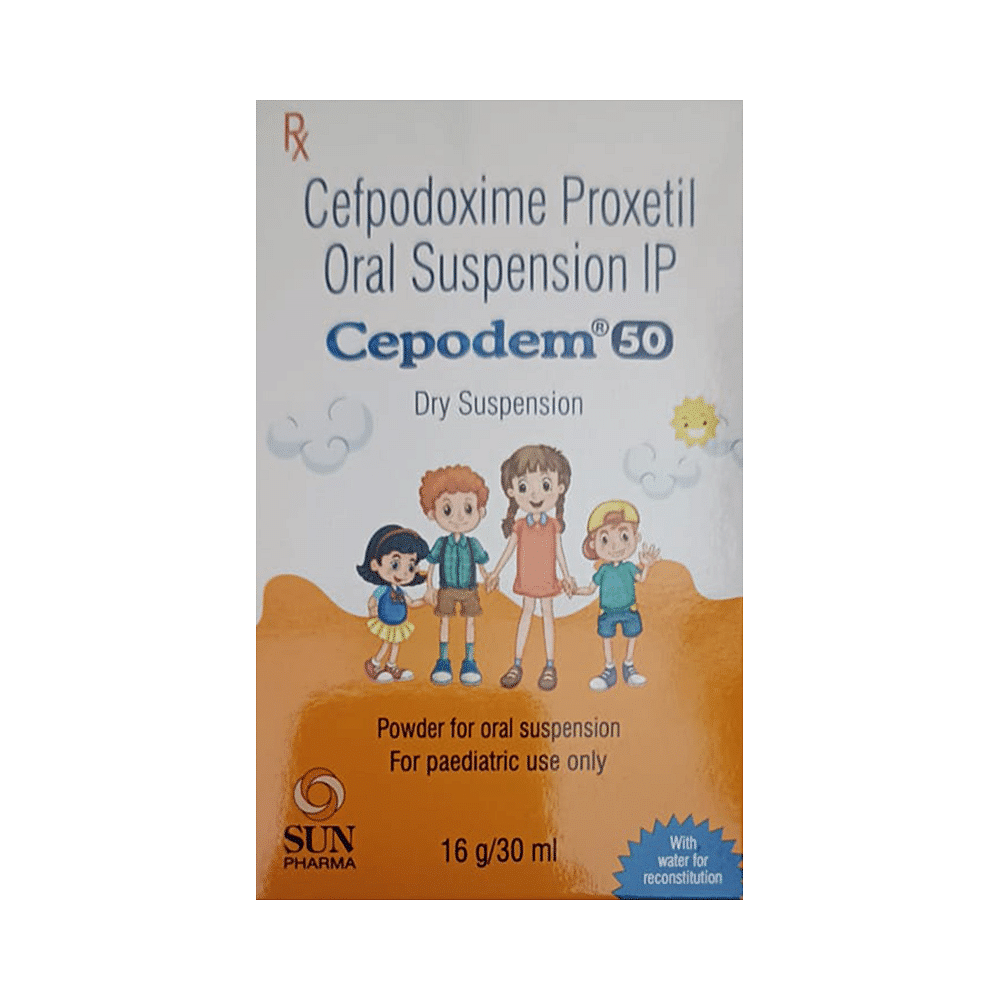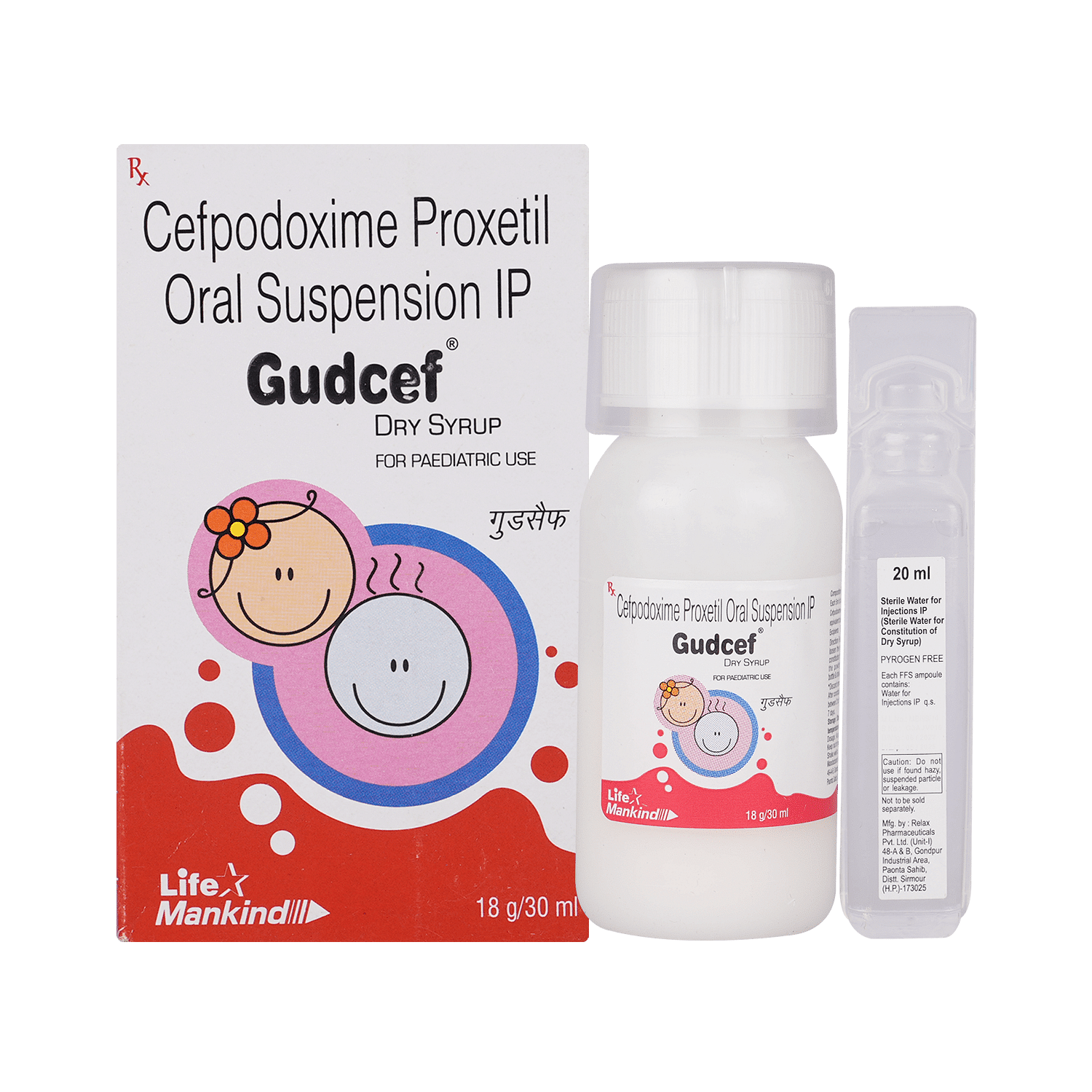
Ampiod Dry Syrup
Manufacturer
Ampira Biotechnics Pvt Ltd
Salt Composition
Cefpodoxime Proxetil (50mg)
Key Information
Short Description
Ampiod Dry Syrup is an antibiotic medicine used to treat a wide range of bacterial infections in children, including ear, eye, nose, throat, lung, skin, gastrointestinal tract, and urinary tract infections, as well as typhoid fever.
Dosage Form
Oral Suspension
Introduction
Ampiod Dry Syrup is an antibiotic medicine commonly given to children for the treatment of a wide range of bacterial infections. It is effective in treating infections targeting the ears, eyes, nose, throat, lungs, skin, gastrointestinal tract, and urinary tract. It is also used to treat typhoid fever in children and adolescents.
Directions for Use
Give this medicine with food to avoid an upset stomach. Encourage your child to drink plenty of water in case diarrhea develops as a side effect.
How it works
Ampiod Dry Syrup is an antibiotic that works by preventing the formation of the bacterial protective covering (cell wall) which is essential for the survival of the bacteria. By doing so, this medicine stops the infection-causing bacteria from growing further and prevents the infection from spreading without making the bacteria resistant to further treatment.
Quick Tips
Your child must complete the entire course of antibiotics. Stopping too soon may cause the bacteria to multiply again or become resistant or cause another infection. Give this medicine with food to avoid an upset stomach. Encourage your child to drink plenty of water in case diarrhea develops as a side effect. Conditions like common cold and flu are caused by viruses. Never use this medicine for such conditions. Only give Ampiod Dry Syrup to your child for their current infection. Never save medicine for future illnesses. Stop this medicine and immediately report to your child’s doctor in case your child develops an itchy rash, facial swelling, or breathing difficulties while taking this medicine.
Related Medicines

Cepodem 50 Dry Suspension

Gudcef Dry Syrup

Podwis Dry Syrup

Podoxyl 50 Dry Syrup

Nefdoxim Dry Syrup

Cefrodox Dry Syrup

Shootbact 50 Dry Syrup Orange

Pecef 50 Oral Suspension

Doxilens 50 D/S Dry Syrup

Jespodime 50 Dry Syrup
Frequently asked questions
What should I do if I accidentally give my child too much of Ampiod Dry Syrup?
Giving your child an extra dose of Ampiod Dry Syrup is unlikely to cause significant harm. However, immediately contact a medical professional for advice. Overdose could lead to unwanted side effects and even worsen the condition.
Are there any potential serious adverse reactions from taking Ampiod Dry Syrup?
Serious adverse reactions associated with this medicine include persistent vomiting, kidney damage, allergic reactions, diarrhea, and severe gastrointestinal infections. Always consult your child’s doctor for help with these situations.
Can I give other medicines at the same time as Ampiod Dry Syrup?
Ampiod Dry Syrup may interact with other medications or substances. Inform your child's doctor of any other medications they are currently taking before initiating Ampiod Dry Syrup. It is crucial to consult a medical professional about administering any additional medications to your child.
Can I get my child vaccinated while on treatment with Ampiod Dry Syrup?
Antibiotics generally do not interfere with vaccine ingredients or cause adverse reactions in children who have recently received a vaccine. However, vaccination should be delayed until the illness has been resolved. After your child recovers, the vaccine can be administered.
What lab tests may my child undergo while on long-term Ampiod Dry Syrup?
Periodically, your doctor may prescribe kidney function and liver function tests to monitor your child's condition.
My child has yellow-green mucus coming out of their nose. Is this a sign of a bacterial infection?
Yellow or green mucus in the nose does not automatically indicate the need for antibiotics during a common cold. During a typical cold, mucus often thickens and changes color from clear to yellow or green. Symptoms usually last 7-10 days.
I’m concerned about my child’s sore throat and ear infection, can I give antibiotics?
No. Antibiotics are not used for viral infections like a sore throat or ear infection. If your child has a sore throat, runny nose, barky cough, pain, and discharge from their ear, it is most likely caused by a virus. Please consult your child's doctor before administering any medications.
Does taking an antibiotic always prevent bacterial infections in viral cases? When do I need to start antibiotics?
Antibiotics are not used for viral infections like sore throats or ear infections. If your child has a common cold and their symptoms are caused by the virus, you shouldn't give them antibiotics because they won’t be effective. Always check with your doctor before starting antibiotics.
Does Ampiod Dry Syrup affect my child’s digestive system?
Children have a sensitive stomach and may experience gastrointestinal upset while taking antibiotics. Ampiod Dry Syrup could further disrupt the balance of good bacteria in their gut, increasing the risk of secondary infections. If your child experiences diarrhea on Ampiod Dry Syrup, do not stop the medication without first consulting your doctor. They might adjust the dose or suggest an alternative treatment.
Can Ampiod Dry Syrup lead to bacterial resistance in my child?
The misuse of antibiotics can contribute to antibiotic resistance. If you're unsure about when and how to use antibiotics, consult your doctor or pharmacist for proper guidance.


